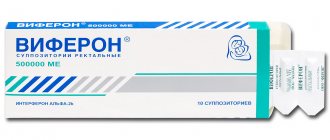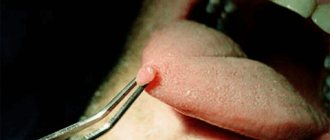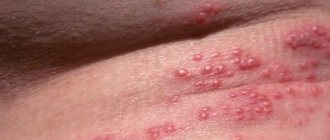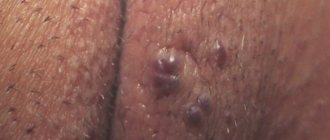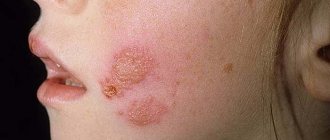Herpes in the intimate area in women or genital herpes in women is one of the most common clinical types of sexually transmitted herpes infection. Genital herpes in women is characterized by the appearance of characteristic rashes on the skin and mucous membranes in the urogenital and/or anal area, characterized by variability in the clinical picture and a tendency towards a persistent recurrent course.
The causative agent of genital herpes is the herpes simplex virus (HSV, Herpes Simplex virus).
Fact Infection with genital herpes in 76% of cases is caused by HSV-2 and in 24% by HSV-1.
In most patients, the causative agent of genital herpes is herpes simplex virus type 2 (HSV-2). There are cases of genital herpes caused by HSV type 1, which reflects the increased prevalence of oral-genital contact in various population groups. In some patients, the disease can be caused simultaneously by two types of herpes simplex virus (HSV-2 and HSV-1).
Genital herpes virus – how long does the disease last?
The content of the article
Genital herpes in men and women is one of the most commonly diagnosed sexually transmitted diseases, caused by the herpes simplex virus type HSV-1 or HSV-2. For many people, the disease is completely asymptomatic. And this does not prevent the virus from being transmitted during sexual intercourse.
Possible symptoms of genital herpes are well known to doctors. There is slight pain, changes on the skin resemble blisters. They are visible in the genital area, in the perineum.
The first wave of symptoms can last 2-3 weeks, sometimes less. In some cases, herpes symptoms may recur, but they are usually less bothersome than the first time.
Antiviral medications relieve the discomfort felt. Patients with chronic symptoms need to take medications every day.
Manifestations and symptoms of herpes in the intimate area in women and men
Herpetic cystitis of women
Herpetic cystitis is a pathology characterized by inflammatory processes in the bladder caused by the herpes virus. This disease manifests itself as discomfort when urinating and hyperemia of the skin and mucous membranes. Women are especially often bothered by the urge to urinate at night. If left untreated, herpetic cystitis can lead to complications, including herpetic salpingoophoritis. In this case, the inflammation affects the ovaries and fallopian tubes.
Herpes of the urethra and bladder
The disease makes itself felt by painful sensations and pain when urinating. There is a frequent urge to go to the toilet, there may be blood in the urine and discomfort in the bladder area. In men, detection of the herpes simplex virus in the urine may indicate inflammation of the prostate gland.
If you suspect herpetic prostatitis, which is characterized by frequent relapses, the patient must undergo a special examination for sexually transmitted infections of a viral nature.
Herpetic lesions of the anal area and rectum
The disease manifests itself with itching, burning and pain in the affected area. Bleeding may occur during bowel movements. As the disease develops, erosions and cracks form on the mucous membrane, which are often attempted to be treated only surgically, without the use of drug antiviral treatment.
Genital herpes - what is it?
Genital herpes is a viral infection that affects the penis in men (penile herpes) and the vulva and vagina in women (vaginal herpes, herpes on the labia), as well as the area around the genitals. Sometimes herpes can also appear on the buttocks and anus.
This disease is caused by the herpes simplex virus. There are two types of herpes simplex virus: herpes simplex virus type 1 and herpes simplex virus type 2.
- Herpes simplex virus type 1 is usually responsible for cold sores on the lips. It is caused by half of the cases of genital herpes.
- Herpes simplex virus type 2 is responsible almost exclusively for the development of genital herpes. Sometimes an infection can result in cold sores on the lips.
Sources
- Vos T., Allen C., Arora M., Barber RM., Bhutta ZA., Brown A., Carter A., Casey DC., Charlson FJ., Chen AZ., Coggeshall M., Cornaby L., Dandona L ., Dicker DJ., Dilegge T., Erskine HE., Ferrari AJ., Fitzmaurice C., Fleming T., Forouzanfar MH., Fullman N., Gething PW., Goldberg EM., Graetz N., Haagsma JA., Johnson CO., Kassebaum NJ., Kawashima T., Kemmer L., Khalil IA., Kinfu Y., Kyu HH., Leung J., Liang X., Lim SS., Lopez AD., Lozano R., Marczak L ., Mensah GA., Mokdad AH., Naghavi M., Nguyen G., Nsoesie E., Olsen H., Pigott DM., Pinho C., Rankin Z., Reinig N., Salomon JA., Sandar L., Smith A., Stanaway J., Steiner C., Teeple S., Thomas BA., Troeger C., Wagner JA., Wang H., Wanga V., Whiteford HA., Zoeckler L., Abajobir AA., Abate KH ., Abbafati C., Abbas KM., Abd-Allah F., Abraham B., Abubakar I., Abu-Raddad LJ., Abu-Rmeileh NM., Ackerman IN., Adebiyi AO., Ademi Z., Adou AK ., Afanvi KA., Agardh EE., Agarwal A., Kiadaliri AA., Ahmadieh H., Ajala ON., Akinyemi RO., Akseer N., Al-Aly Z., Alam K., Alam NK., Aldhahri SF ., Alegretti M.A., Alemu ZA., Alexander LT., Alhabib S., Ali R., Alkerwi A., Alla F., Allebeck P., Al-Raddadi R., Alsharif U., Altirkawi KA., Alvis- Guzman N., Amare AT., Amberbir A., Amini H., Ammar W., Amrock SM., Andersen HH., Anderson GM., Anderson BO., Antonio CA., Aregay AF., Ärnlöv J., Artaman A ., Asayesh H., Assadi R., Atique S., Avokpaho EF., Awasthi A., Quintanilla BP., Azzopardi P., Bacha U., Badawi A., Balakrishnan K., Banerjee A., Barac A., Barker-Collo SL., Bärnighausen T., Barregard L., Barrero LH., Basu A., Bazargan-Hejazi S., Bell B., Bell ML., Bennett DA., Bensenor IM., Benzian H., Berhane A ., Bernabé E., Betsu BD., Beyene AS., Bhala N., Bhatt S., Biadgilign S., Bienhoff K., Bikbov B., Biryukov S., Bisanzio D., Bjertness E., Blore J., Borschmann R., Boufous S., Brainin M., Brazinova A., Breitborde NJ., Brown J., Buchbinder R., Buckle GC., Butt ZA., Calabria B., Campos-Nonato IR., Campuzano JC., Carabin H., Cárdenas R., Carpenter DO., Carrero JJ., Castañeda-Orjuela CA., Rivas JC., Catalá-López F., Chang JC., Chiang PP., Chibueze CE., Chisumpa VH., Choi JJ ., Chowdhury R., Christensen H., Christopher DJ., Ciobanu LG., Cirillo M., Coates MM., Colquhoun SM., Cooper C., Cortinovis M., Crump JA., Damtew SA., Dandona R., Daoud F., Dargan PI., das Neves J., Davey G., Davis AC., Leo D., Degenhardt L., Del Gobbo LC., Dellavalle RP., Deribe K., Deribew A., Derrett S., Jarlais DC., Dharmaratne SD., Dhillon PK., Diaz-Torné C., Ding EL., Driscoll TR., Duan L., Dubey M., Duncan BB., Ebrahimi H., Ellenbogen RG., Elyazar I., Endres M., Endries AY., Ermakov SP., Eshrati B., Estep K., Farid TA., Farinha CS., Faro A., Farvid MS., Farzadfar F., Feigin VL., Felson DT., Fereshtehnejad SM ., Fernandes JG., Fernandes JC., Fischer F., Fitchett JR., Foreman K., Fowkes FG., Fox J., Franklin RC., Friedman J., Frostad J., Fürst T., Futran ND., Gabbe B., Ganguly P., Gankpé FG., Gebre T., Gebrehiwot TT., Gebremedhin AT., Geleijnse JM., Gessner BD., Gibney KB., Ginawi IA., Giref AZ., Giroud M., Gishu MD ., Glaser E., Godwin WW., Gomez-Dantes H., Gona P., Goodridge A., Gopalani SV., Gotay CC., Goto A., Gouda HN., Grainger R., Greaves F., Guillemin F ., Guo Y., Gupta R., Gupta R., Gupta V., Gutiérrez RA., Haile D., Hailu AD., Hailu GB., Halasa YA., Hamadeh RR., Hamidi S., Hammami M., Hancock J., Handal AJ., Hankey GJ., Hao Y., Harb HL., Harikrishnan S., Haro JM., Havmoeller R., Hay RJ., Heredia-Pi IB., Heydarpour P., Hoek HW., Horino M., Horita N., Hosgood HD., Hoy DG., Htet AS., Huang H., Huang JJ., Huynh C., Iannarone M., Iburg KM., Innos K., Inoue M., Iyer VJ ., Jacobsen KH., Jahanmehr N., Jakovljevic MB., Javanbakht M., Jayatilleke AU., Jee SH., Jeemon P., Jensen PN., Jiang Y., Jibat T., Jimenez-Corona A., Jin Y ., Jonas JB., Kabir Z., Kalkonde Y., Kamal R., Kan H., Karch A., Karema CK., Karimkhani C., Kasaeian A., Kaul A., Kawakami N., Keiyoro PN., Kemp AH., Keren A., Kesavachandran CN., Khader YS., Khan AR., Khan EA., Khang YH., Khera S., Khoja TA., Khubchandani J., Kieling C., Kim P., Kim CI ., Kim D., Kim YJ., Kissoon N., Knibbs LD., Knudsen AK., Kokubo Y., Kolte D., Kopec JA., Kosen S., Kotsakis GA., Koul PA., Koyanagi A., Kravchenko M., Defo BK., Bicer BK., Kudom AA., Kuipers EJ., Kumar GA., Kutz M., Kwan GF., Lal A., Lalloo R., Lallukka T., Lam H., Lam JO ., Langan S.M., Larsson A., Lavados PM., Leasher J.L., Leigh J., Leung R., Levi M., Li Y., Li Y., Liang J., Liu S., Liu Y., Lloyd BK., Lo WD., Logroscino G., Looker KJ., Lotufo PA., Lunevicius R., Lyons RA., Mackay MT., Magdy M., Razek AE., Mahdavi M., Majdan M., Majeed A ., Malekzadeh R., Marcenes W., Margolis DJ., Martinez-Raga J., Masiye F., Massano J., McGarvey ST., McGrath JJ., McKee M., McMahon BJ., Meaney PA., Mehari A ., Mejia-Rodriguez F., Mekonnen AB., Melaku YA., Memiah P., Memish ZA., Mendoza W., Meretoja A., Meretoja TJ., Mhimbira FA., Miller TR., Mills EJ., Mirarefin M ., Mitchell PB., Mock CN., Mohammadi A., Mohammed S., Monasta L., Hernandez JC., Montico M., Mooney MD., Moradi-Lakeh M., Morawska L., Mueller UO., Mullany E ., Mumford JE., Murdoch ME., Nachega JB., Nagel G., Naheed A., Naldi L., Nangia V., Newton JN., Ng M., Ngalesoni FN., Nguyen QL., Nisar MI., Pete PM., Nolla JM., Norheim OF., Norman RE., Norrving B., Nunes BP., Ogbo FA., Oh IH., Ohkubo T., Olivares PR., Olusanya BO., Olusanya JO., Ortiz A ., Osman M., Ota E., Pa M., Park EK., Parsaeian M., de Azeredo Passos VM., Caicedo AJ., Patten SB., Patton GC., Pereira DM., Perez-Padilla R., Perico N., Pesudovs K., Petzold M., Phillips MR., Piel FB., Pillay JD., Pishgar F., Plass D., Platts-Mills JA., Polinder S., Pond CD., Popova S., Poulton RG., Pourmalek F., Prabhakaran D., Prasad NM., Qorbani M., Rabiee RH., Radfar A., Rafay A., Rahimi K., Rahimi-Movaghar V., Rahman M., Rahman MH., Rahman SU., Rai RK., Rajsic S., Ram U., Rao P., Refaat AH., Reitsma MB., Remuzzi G., Resnikoff S., Reynolds A., Ribeiro AL., Blancas MJ., Roba HS ., Rojas-Rueda D., Ronfani L., Roshandel G., Roth GA., Rothenbacher D., Roy A., Sagar R., Sahathevan R., Sanabria JR., Sanchez-Niño MD., Santos IS., Santos JV., Sarmiento-Suarez R., Sartorius B., Satpathy M., Savic M., Sawhney M., Schaub MP., Schmidt MI., Schneider IJ., Schöttker B., Schwebel DC., Scott JG., Seedat S., Sepanlou SG., Servan-Mori EE., Shackelford KA., Shaheen A., Shaikh MA., Sharma R., Sharma U., Shen J., Shepard DS., Sheth KN., Shibuya K., Shin MJ., Shiri R., Shiue I., Shrime MG., Sigfusdottir ID., Silva DA., Silveira DG., Singh A., Singh JA., Singh OP., Singh PK., Sivonda A., Skirbekk V ., Skogen JC., Sligar A., Sliwa K., Soljak M., Søreide K., Soriano JB., Sposato LA., Sreeramareddy CT., Stathopoulou V., Steel N., Stein DJ., Steiner TJ., Steinke S., Stovner L., Stroumpoulis K., Sunguya BF., Sur P., Swaminathan S., Sykes BL., Szoeke CE., Tabarés-Seisdedos R., Takala JS., Tandon N., Tanne D., Tavakkoli M., Taye B., Taylor HR., Ao BJ., Tedla BA., Terkawi AS., Thomson AJ., Thorne-Lyman AL., Thrift AG., Thurston GD., Tobe-Gai R., Tonelli M ., Topor-Madry R., Topouzis F., Tran BX., Dimbuene ZT., Tsilimbaris M., Tura AK., Tuzcu EM., Tyrovolas S., Ukwaja KN., Undurraga EA., Uneke CJ., Uthman OA ., van Gool CH., Varakin YY., Vasankari T., Venketasubramanian N., Verma RK., Violante FS., Vladimirov SK., Vlassov VV., Vollset SE., Wagner GR., Waller SG., Wang L. , Watkins DA., Weichenthal S., Weiderpass E., Weintraub RG., Werdecker A., Westerman R., White RA., Williams HC., Wiysonge CS., Wolfe CD., Won S., Woodbrook R., Wubshet M., Xavier D., Xu G., Yadav AK., Yan LL., Yano Y., Yaseri M., Ye P., Yebyo HG., Yip P., Yonemoto N., Yoon SJ., Younis MZ. , Yu C., Zaidi Z., Zaki ME., Zeeb H., Zhou M., Zodpey S., Zuhlke LJ., Murray CJ. Global, regional, and national incidence, prevalence, and years lived with disability for 310 diseases and injuries, 1990-2015: a systematic analysis for the Global Burden of Disease Study 2015. // Lancet - 2016 - Vol388 - N10053 - p.1545 -1602; PMID:27733282
Genital herpes - how can you get infected?
Genital herpes is transmitted mainly through contact with a person who is already a carrier of the virus. The mucous membrane lining the mouth, genitals and anus is very susceptible to infection. That is, the virus most often passes from one person to another during sexual intercourse (including oral).
The herpes simplex virus can also enter another person's body through wounds or cracks in the skin on other parts of the body: fingers, hands, knees, etc., as long as the contact touches an infected area of skin. Re-infection with your own virus through accidental touch is unlikely.
Transmission of herpes from the mouth to the genitals during oral sex can occur when one of the partners develops symptoms of herpes on the lips.
Drug prevention of herpes
Drug prophylaxis can be emergency or planned.
Emergency is performed after unprotected sexual intercourse.
Planned - in advance.
Emergency drug prevention for herpes is ineffective.
Even if a person receives medications immediately after coitus, this will not reduce the risk of infection.
The symptoms of herpes will be much less pronounced.
Perhaps they won't appear at all.
But the pathogen will still penetrate the body.
It will persist in the nerve ganglia and may cause exacerbation in the future.
Planned prevention is effective.
The source of the infection should receive the drugs, not the person who may become infected.
Genital herpes - symptoms
The first infection with the herpes simplex virus is often called the primary infection. Such an infection may (but does not necessarily) cause symptoms.
After the initial infection, the virus is not eliminated from the body, but lives in it in an inactive form. In some patients, the virus occasionally wakes up and moves to the surface of the skin. This, in turn, provokes a relapse of symptoms of genital herpes if the primary infection concerned the genitals, or a recurrence of herpes lips if the primary infection developed in the mouth area.
Most people have no symptoms after contracting the sexual herpes virus; 8 out of 10 people with genital herpes don't even know they have it. Sometimes only very mild symptoms may appear that are difficult to associate with genital herpes.
These symptoms may include a slight burning sensation or a slight redness that quickly disappears. In such people, the virus sleeps and never causes a wave of symptoms to recur. However, even people who develop the disease asymptomatically pose a threat to their sexual partners. In fact, this is how most cases of genital herpes infection occur.
Genital herpes - first symptoms
At the very beginning, symptoms of genital herpes infection take the form of slightly elevated body temperature, general pain and malaise. Small groups of painful blisters appear around the genitals or anus. Herpthetic changes can be visible on the labia, on the clitoris, near the entrance to the vagina, on the thighs, around the anus.
The blisters take another 1-2 weeks to grow before bursting and turning into shallow, painful ulcers. The lymph nodes in the groin may become enlarged and palpable as lumps in the upper legs. Frequently, urination is associated with pain, especially in the case of women who experience vaginal discharge.
Women also experience blisters and sores on the cervix. Blisters and sores usually develop within 10 to 20 days and then gradually disappear without leaving a scar. Sometimes symptoms appear in just a few days.
The first symptoms of genital herpes appear months or even years after infection. Therefore, the first wave of symptoms may occur when a person has sexual intercourse with only one regular partner. There is a possibility that the infection occurred months or years earlier as a result of sexual contact with a previous partner or a partner who did not know that he carried the virus.
It is not entirely clear why some people have symptoms of infection and others do not, or why the first wave of symptoms occurs months or years after the actual infection. This may be due to the immune system's response to the virus.
What is genital herpes
Genital herpes is a disease caused by the herpes simplex virus type 2. Genital herpes is a sexually transmitted infection (STI). The main characteristics of the disease: lesions of the skin and mucous membranes of the genitourinary organs, as well as the anus.
The main route of transmission of the disease: contact. Infection can occur through sexual contact and household contact (through shared hygiene items). Infection can occur both when the partner has a clinical diagnosis of the disease, and in their absence.
In 70-75% of cases, the disease is caused by herpes simplex virus type 2 (HSV-2), and in 25-30% there is herpes simplex virus type 1 (HSV-1).
There are 4 forms of genital herpes:
- Primary (no antibodies, disease detected for the first time);
- Secondary (there are antibodies, but there is no history of genital herpes);
- Recurrent (there are antibodies to HSV, there have been previous episodes of the disease);
- Asymptomatic.
It is worth noting that herpetic infection does not cause damage to other organs (there is no herpetic prostatitis or epididymitis). However, constant relapses of genital herpes can reduce the body’s natural immune system, which causes the activation of the bacterial flora. In this case, other infectious complications arise.
Symptoms of the disease
Most often, the disease occurs in a localized (limited) manner. First, the appearance of prodromal symptoms is characteristic, which include discomfort, burning, itching in the pubic area, folds or anorectal area. The rash is often accompanied by symptoms of general intoxication: weakness, fever to subfebrile levels, chills, headache.
The incubation period is 3-7 days. The disease begins acutely, with blisters appearing on the head of the penis and the inner layer of the foreskin, surrounded by a red border. Less commonly, bubbles appear on the scrotum and perineum. Breaking through, the bubbles leave erosions in their place, which can merge, forming large lesions in severe cases.
The rash consists of small blisters filled with serous contents. The elements open after 2-3 days, leaving behind erosions or ulcers.
A characteristic symptom of genital herpes is enlargement of the inguinal lymph nodes. The nodes can be felt and sensitivity appears when pressed. Pain and burning may occur when urinating (if urethritis is attached). In the morning, there is often discharge from the urethra, usually in the form of a drop on the underwear.
Depending on the route of transmission of the infection, rashes around the anus or in the rectum may additionally be detected. In this case, patients may also complain of pain during bowel movements and the appearance of traces of blood and mucus in the stool.
If the patient is talking about relapses of genital herpes, the clinical picture may vary depending on the state of immunity. With severe immunodeficiency, irreversible skin changes can develop (the appearance of erosions, ulcers), as well as lymphostasis and the addition of a secondary infection.
Causes of genital herpes
The herpes virus is an incredibly common and persistent virus. However, it is not able to penetrate the intact layer of skin. For infection with the herpes simplex virus to occur, contact of the damaged area of the skin or mucous membrane of the carrier with the same area of skin of a healthy person is necessary. Moreover, a person does not necessarily have to be an active carrier of the virus; it is enough for him to have antibodies to the virus. It is also worth noting that a person sheds the virus even before symptoms of the disease appear.
As mentioned above, genital herpes is caused by HSV-2 and HSV-1. Most often, transmission of the virus occurs through sexual contact. Also common is the household method of transmitting the virus when another person uses the carrier’s personal hygiene items.
Diagnosis of genital herpes
Diagnosis of genital herpes in men is generally not difficult, since the disease occurs with specific, striking clinical manifestations. Primary elements of herpes, blisters with serous fluid, the presence of symptoms of general intoxication, specific localization, as well as lymphangitis - all these symptoms indicate a diagnosis of “genital herpes”.
There are also a number of laboratory tests that help verify the diagnosis. After all, the clinic can often be vague, raise suspicions of other STIs, or be completely absent. The following methods are used:
- Serological method (detection of antibodies to the virus);
- Cytological method (detection of specific virus cells);
- Virological method (virus infection of cell cultures with detection of pathological effects);
- Biological method (infection of animal cells with a virus).
Treatment of genital herpes
Currently, there is no drug or treatment that can completely remove the herpes simplex virus from the human body. Treatment with antiviral drugs is not the only correct one; these drugs only affect the duration and frequency of episodes of the disease and reduce the severity of relapses. Analgesics (ibuprofen, paracetamol and others) have only a symptomatic effect, reducing fever and alleviating general symptoms. Local anesthetics relieve itching and pain from the rash.
A standard treatment regimen for an episode of genital herpes includes:
- Antiviral drug (Acyclovir, valacyclovir and others). Available in various forms: tablets, ointments, powders for intravenous infusions. The method of administration is selected depending on the severity of the disease.
- Local anesthetics (lidocaine, benzocaine) - according to indications, intradermally, if the patient is unable to tolerate itching and local pain
- Non-steroidal anti-inflammatory drugs (ibuprofen, paracetamol and others) – for general viral symptoms (fever, aches, weakness, headaches)
- Immunotherapy (antibody preparations, monoclonal antibodies) is used according to indications
- Alternative methods: gene therapy, restorative ointments, herbal remedies
Prognosis and prevention
If the herpes simplex virus has once entered the human body, it will remain in the “dormant” stage, resting in the sensory ganglia of the nervous system. The DNA of the virus is integrated into the nucleus of the nerve cell, but does not produce new viral particles while in this phase. The frequency of further relapses is extremely difficult to predict, since at the moment the mechanism of action of the virus enzymes is still not fully understood.
For most people who are newly infected, it is believed that the next relapse most often occurs within the first year. The prodromal period during a relapse can last from several hours to several days; the rash itself is much easier to tolerate than the first time.
The reasons for the reactivation of the virus are unknown. It has been studied that triggers for the recurrence of herpes can be any infectious diseases that affect a decrease in immunity.
The forecast is generally neutral. The severity of repeated episodes of the disease depends only on the state of the immune system, as well as the ability of the skin and mucous membranes to regenerate. In some patients, erosions and ulcers may form, and in some, traces of burst blisters disappear without leaving any traces.
As we have already found out, the infection caused by the herpes simplex virus is completely untreatable. So isn't it easier to protect yourself from this infection?
It is possible to prevent herpes, but this still cannot protect you completely. Many people are carriers of the herpes simplex virus, but may not even know it. The virus may be in a “dormant” state in the ganglion nuclei and never manifest itself.
Methods for preventing genital herpes include the following:
- Barrier method. Using condoms as a method of contraception is a widely available option that not only protects against unwanted pregnancy, but also against the transmission of STIs. There are male and female condoms, with female condoms offering a higher percentage of protection. Condoms are not able to completely protect against the transmission of the herpes simplex virus, since free contact of the scrotum, buttocks and thighs is possible during sexual intercourse;
- Vaccination. This method is under development, but after completion of clinical studies, it may become the most effective in preventing diseases caused by the herpes virus;
- Antiviral drugs. Carriers of the virus are recommended to take antiviral drugs not only during the period of exacerbation of the disease, but also during the latent phases, which can reduce the process of virus shedding.
What to do if you suspect you have an STI
Treatment of STIs is a sensitive issue that can arise in the life of any man. However, this problem is almost impossible to get around. The most common cause of STIs is questionable sexual intercourse without the use of barrier contraception.
Many men are in no hurry to go to the doctor right away, which is fundamentally wrong, since STIs in men are very insidious. Due to the structure of the male genitourinary system, infectious diseases proceed completely differently than in women. The main difference lies in the erased clinical picture, and sometimes in its complete absence. Therefore, if you are not careful about your health, you can miss the moment and end up with serious complications.
The main protection against complications of sexually transmitted infections is barrier methods of contraception and your own awareness and vigilance!
If, nevertheless, this unpleasant episode happened in your life, contact Professor Chaly’s men’s health clinic. A professional team of urologists and andrologists will help you effectively and reliably cure any disease. You shouldn’t think about embarrassment and awkwardness, because the clinic’s specialists are not only qualified doctors, they are, first of all, sensitive people who are able to find an approach to any patient.
Information about the clinic
Professor Chaly's Men's Health Clinic is a specialized medical institution that uses a comprehensive and individual approach to the treatment of diseases in men. The clinic was organized in 1996 by a group of urologists and andrologists under the leadership of Professor M.E. Chaly.
The clinic’s specialists are true professionals in their field, urologists and andrologists of the highest category. The clinic’s doctors find an individual approach to each client in order to effectively approach the treatment of the disease.
Doctors at Professor Chaly’s men’s health clinic use the most accurate and proven innovative technologies in their work. The clinic’s specialists do not stop there, continuing to offer new methods of treatment and diagnosis of male diseases. Currently the clinic has 5 patents.
The clinic's work experience is 23 years. During this time, the clinic has established itself as a serious medical institution that provides assistance in curing male diseases. According to clinic statistics, 90% of diseases can be completely cured or go into stable remission.
Professor Chaly's men's health clinic helps even in the most severe cases! If you have persistent dysfunctions of the body, severe chronic diseases that cannot be cured by other hospitals, or acute diseases, you should not self-medicate. Contact the clinic at the numbers listed on the website.
Treatment at the Men's Health Clinic of Professor Chaly
Treatment of sexually transmitted infections at Professor Chalyi’s men’s health clinic includes the following range of services:
- Initial consultation with a urologist-andrologist;
- Ultrasound diagnostics;
- Tests for 26 types of STIs;
- Complete treatment based on examination results.
The Men's Health Clinic is the first urological clinic in Russia to be certified. The clinic’s doctors prescribe drugs not only for intravenous or oral administration, but also use transdermal pharmacophoresis in the treatment process. If necessary, the latest development is used, a system that allows the drug to be delivered to the required area percutaneously.
Along with innovative technologies, the clinic’s doctors also actively use primary methods for diagnosing and treating STIs.
Pharmacological combinations used to treat diseases are being actively improved, and new combinations of drugs are being used. The doses and frequency of taking antiviral drugs are changed for the effective treatment of viral dermatoses (such as genital herpes).
The clinic’s doctors analyze morbidity statistics, work with their accumulated experience, and create new methods for more accurate diagnosis and treatment.
The specialists at Professor Chaly’s clinic can help you with any health-related issue! Remember: you should not self-medicate, because all questions about whether you have a disease should be decided by doctors. Contact the clinic at the numbers listed on the website. One of the phone numbers is available 24 hours a day.
Genital herpes - relapses
Some people experience recurrences of genital herpes symptoms. Scientists cannot explain why an inactive virus wakes up from time to time. Relapses are often milder and last shorter than the first wave. In case of relapses, symptoms usually occur within 7-10 days.
Most people do not complain of fever or malaise. Mild tingling or itching of the genitals for 12–24 hours may indicate a recurrence of symptoms of the disease. The intervals between individual relapses vary.
Over time, relapses of genital herpes appear less frequently. Relapse rates may vary among people already dealing with them. Some people experience them 6 or more times a year, while others experience them much less frequently.
As a rule, in the first 2 years after the first wave of symptoms, relapses occur 4 to 5 times. Some people do not relapse at all. Sometimes it is possible to identify factors that cause symptoms to recur. These could be: sunburn, physical illness, excessive alcohol consumption, stress.
Why do you need a vaccine for herpes in the vagina?
Vaccination is prescribed not for prophylactic, but for therapeutic purposes.
It is indicated for patients with a high frequency of recurrent herpes infections.
Vaccination is used only during the period of remission.
The drug Vitagerpavak is used.
The first dose is prescribed 10 days after the symptoms have subsided.
It is injected intradermally into the forearm.
A total of 5 injections are required.
Injections are performed every 7 days.
The exception is women with very frequent recurrences of vaginal herpes.
If the disease worsens more often than once a month, the drug is administered at intervals of 10 days.
After completing the vaccination course, there should be a break of 6 months.
After this, the course is repeated.
The herpes vaccine is safe because it contains an inactivated (non-living) virus.
At the same time, its antigens are preserved, which provokes an immune response in the body.
There are usually no side effects.
If they exist, they pass quickly and do not cause significant discomfort.
There may be soreness and redness at the injection site.
There may be an increase in body temperature on the first day.
Contraindications to the administration of the vaccine:
- acute herpes
- any other acute infections
- severe somatic diseases
- cancer
- pregnancy
On the day of vaccination and for 2-3 days after it, you should not drink alcohol.
What tests should be taken for genital herpes?
As a rule, no additional research is required. The pattern of lesions, their location and other symptoms are sufficiently characteristic to make a diagnosis of genital herpes. In case of doubt and for invasive infections, the gynecologist prescribes:
- Culture analysis
. Isolation of the virus from a cell culture requires taking a smear from the lesions, but the absence of the virus in the culture (negative result) does not exclude infection; - PCR method
. Requires taking smears from lesions. The method is more sensitive than isolation in detecting infection, but a negative result does not rule out infection. - Serological tests
. They allow you to detect antibodies to the HSV virus (they appear after a few weeks) and differentiate the type of virus that caused the infection. If an antibody to HSV-2 is detected, genital herpes is detected and thus increases the risk of recurrence in that location. Antibodies to HSV-1 indicate infection with herpes labialis, and thus the risk of recurrence of lesions in the genital area is lower.
Controlling the cure of herpes in the vagina
After specific treatment, clinical symptoms are assessed.
Laboratory control is not required.
Because herpes infection cannot be cured.
If suppressive therapy is prescribed, the results are also assessed clinically.
After discontinuation of maintenance treatment, its effectiveness is judged by two relapses.
Assess the time intervals at which they occurred and how severe the symptoms were.
Based on the results of monitoring, a decision may be made to resume suppressive therapy.
Treatment of genital herpes with ointment - how effective is it?
A number of medications are used to treat and relieve symptoms of genital herpes.
Over-the-counter painkillers such as paracetamol and ibuprofen can help relieve pain. If there is pain when urinating, it is recommended to take a warm bath.
Anesthetic ointment for genital herpes with iceocaine relieves itching or pain. You can lubricate the skin with ointment 5 minutes before urinating to relieve pain. Some patients may be allergic to the pain-relieving ointment, and using such a drug may worsen symptoms. Instead of anesthetic ointment, you can rub Vaseline into the skin before urinating.
Drugs for genital herpes
Antiviral drugs, such as acyclovir, do not remove the virus from the body. Their goal is to inhibit (suppress) the process of its reproduction. These types of medications are most effective during the first episode of symptoms. They reduce symptoms and their duration - provided that therapy is started within 5 days of the onset of the first symptoms.
Treatment for genital herpes usually lasts 5 days, but it can be extended if the blisters are still present.
Antiviral medications for herpes may not be needed while treating relapses. This is because the symptoms are then much milder than the first time and last only a few days. However, in a situation where the symptoms during relapses are very annoying, therapy with antiviral drugs is necessary.
To shorten the duration of the disease and relieve symptoms, you should start taking the drug as soon as possible. Early treatment offers a better chance of herpes healing faster and reducing the symptoms of the infection more effectively.
If relapses occur frequently, you may need to take an antiviral drug daily. In people using this form of treatment, relapses are either completely inhibited or their frequency is significantly reduced.
How to choose a medicine for herpes in intimate places and what interferons have to do with it
As mentioned above, the HH virus, which can remain “dormant” in the body, can become active when the immune system is weakened. Activation of viruses gives a signal to the body that it is necessary to “turn on” the natural antiviral defense system - interferons (IFNs), which are protein molecules with nonspecific activity. They are able to act on a wide range of pathogens. We can say that interferons act as a universal “security service” of the body, which is activated before other parts of the immune system begin to operate.
However, the body's own interferons may not be enough. Immunological studies show that recurrent HH can lead to a decrease in IFN production.ii Under these conditions, the fight against viruses is significantly more difficult. The spread of the virus increases and the capture of neighboring cells becomes more frequent. Thus, the disease develops more and more actively. In this situation, the use of external interferons is justified. Such therapy will help compensate for the lack of one’s own interferon, as well as bring immunity levels back to normal.
Genital herpes - treatment at home
A cold compress may provide relief. Ice cubes wrapped in a towel are placed on the affected areas for 5-10 minutes. Do not apply ice directly to the skin.
It is important to take in plenty of fluids. This will make the urine more dilute, making it easier and less painful to pass through.
Avoid scented soaps, bath lotions, and other similar products that irritate your skin.
Do not share a towel or sponge - this will minimize the risk of infection.
Sexual abstinence is indicated until the blisters and ulcers disappear and until a subsequent visit to the doctor.
Genital herpes and sexual intercourse
If partners are carriers of the same virus, there is no possibility of re-infection.
It should be remembered that the disease does not have to be accompanied by any symptoms. But the herpes simplex virus is highly contagious when there are blisters. Sexual intercourse in this state is associated with a high risk of transmitting the virus to a partner. Therefore, it is recommended to avoid sexual activity from the moment the first symptoms appear until they disappear completely.
Using a condom does not provide complete protection against infection, as it only protects a covered area of the body.
If you have no symptoms of genital herpes, you are less likely to pass the virus on to your partner. However, sometimes it happens that the virus is present on the surface of the skin of the genital organs. Therefore, there is a certain risk of contracting the virus through sexual intercourse, even in the absence of any symptoms.
Using a condom during every sexual intercourse can further protect yourself from infection. However, it should be remembered that a condom does not guarantee complete protection against transmission of the virus to a partner. People who take antiviral drugs for a long time are also less likely to contract the virus.
Treatment of herpes in the intimate area with folk remedies: will traditional medicine help?
Traditional medicine existed in all periods of human history, and the experience of traditional healers multiplied over the millennia and was passed on from generation to generation. True, one cannot help but admit that today many of the recipes that our ancestors used have been lost and forgotten, and the assessment of traditional medicine by specialists is still ambiguous. What happens when treated with traditional medicine methods
Today, traditional medicine offers both rational methods, which, under certain conditions, can really help cope with various diseases, and irrational ones, which deserve critical evaluation by doctors. But this does not stop those who, instead of turning to a specialist, decided to help themselves on their own by testing the effectiveness of traditional medicine recipes. As a rule, such people will be disappointed - no decoctions, infusions, applications of medicinal herbs and other drugs prepared at home can help get rid of the manifestations of herpes in the intimate area. It must be remembered that refusal to see a doctor and lack of adequate treatment can lead to unpredictable consequences and the development of life-threatening complications.
Only antiviral drugs that not only relieve symptoms, but also fight the root cause of the disease can help reduce the severity and shorten the course of the disease.
